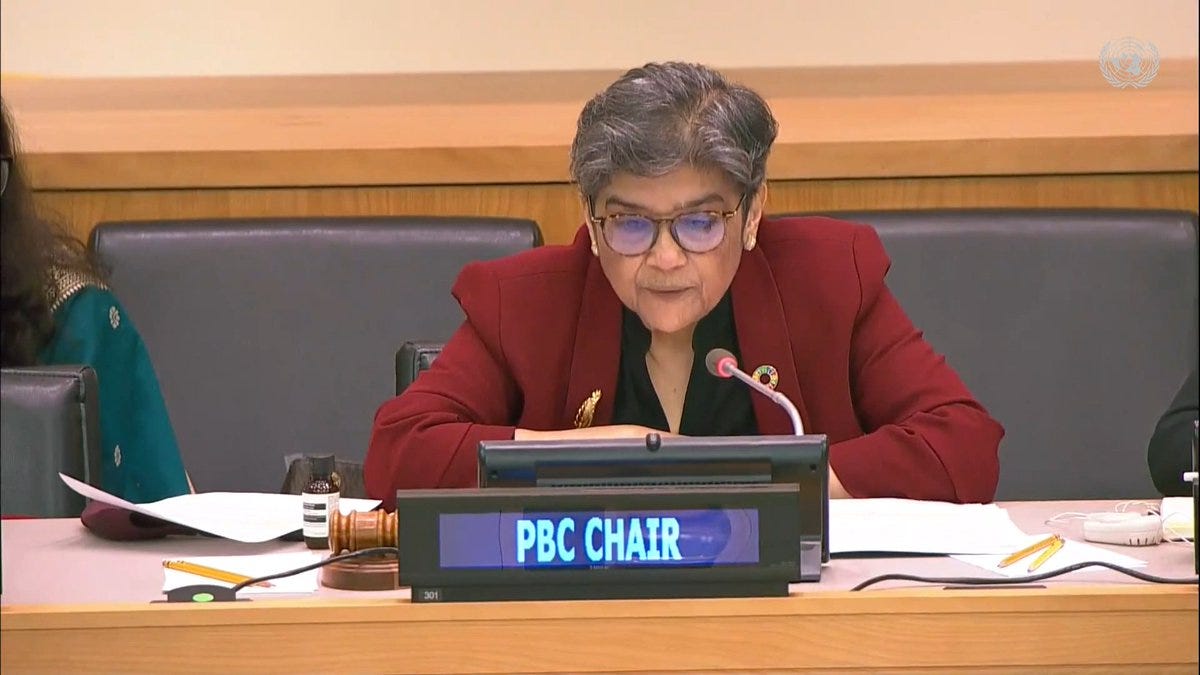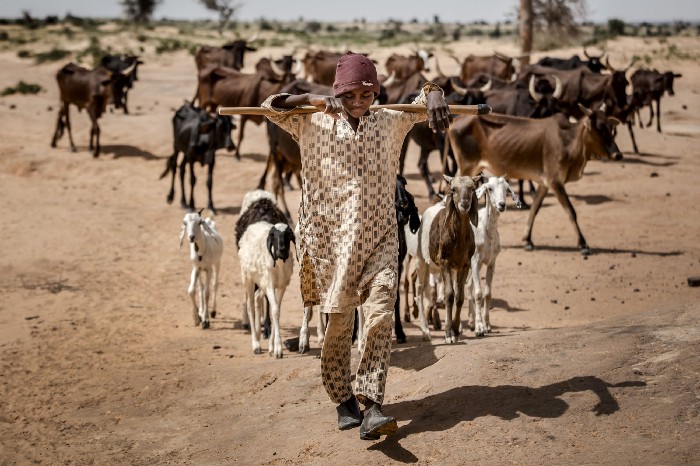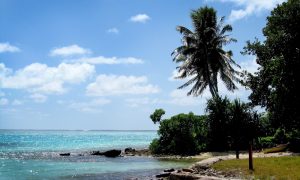The devastating effects of climate change are increasingly obvious. Recent trends point to sustained and possibly irreversible consequences that could undermine security and development gains and endanger the livelihoods of millions of people. Peacebuilding efforts are already becoming more challenging due to climate-change-induced risks. Climate disruption across regions in Sub-Saharan Africa, South Asia, and Latin America has increased humanitarian vulnerability, and as a result heightened pressure on UN agencies responding to crises. The scale and complexity of the climate-change challenge and its impact on peace and security calls for cooperation across the United Nations system.
The question of how to deal with the consequences of climate change on peace and security across the globe is increasingly pressing. At the United Nations, the issue is bringing together different entities in innovative ways. The work of the UN Peacebuilding Commission (PBC) with the International Organization for Migration (IOM) and other institutions to try to mitigate the risks linked to climate change is a case in point.

At a basic level, this work entails providing a platform for discussion and advocacy on climate-sensitive approaches that address the root causes of insecurity.
“Climate change acts as a risk multiplier and exacerbates underlying vulnerabilities,” Ambassador Rabab Fatima, current PBC Chair and Permanent Representative of Bangladesh to the United Nations, told Politically Speaking. “We see growing interest among countries and regions that are facing adverse impacts of climate change to seek PBC’s engagement,” she added. The PBC has increased its support to these countries and regions in their efforts to integrate climate change considerations in their peacebuilding priorities, as reflected in the Commission’s work program for 2022. “The first substantive meeting of the PBC in 2022 was dedicated to climate-related peace and development in the Sahel, giving voice to IOM, a key operational actor on the topic,” Ambassador Fatima said. “This would be the first of many such collaborations,” she added, noting that other upcoming engagements will include climate security in the Pacific Islands and a dedicated meeting with International Financial Institutions (IFIs).

IOM Director General António Vitorino identifies worsening livelihood conditions, increased migration, changing pastoral mobility patterns, tactical considerations by armed groups and elite exploitation of local grievances as some of the effects of climate-related environmental change in vulnerable regions. “Indeed, climate and environmental changes have the potential to contribute to multidimensional security and development risks, by exacerbating competition for depleted natural resources, destroying traditional livelihoods and habitats, causing loss and damages, and affecting migration and displacement patterns,” he said.
IOM’s Institutional Strategy on Migration, Environment and Climate Change 2021–2030 guides the agency’s action in this area. “The Strategy reaffirms our vision to support states in their efforts to achieve orderly, safe, responsible, and regular international migration and to ensure that all people on the move and those internally displaced by the adverse impacts of climate change, environmental degradation, and disasters due to natural hazards are assisted and protected, and placed at the center of IOM’s work,” Vitorino said.
At the PBC, IOM showcased action-oriented impact through its dedicated Migration, Environment and Climate Change (MECC) Division which develops operational, policy, and advocacy programs on environmental migration issues. “Our action aims to strengthen communities’ resilience by developing solutions through a Humanitarian, Peace, and Development Nexus approach,” Vitorino noted.
Since 2018, IOM, the Food and Agriculture Organization (FAO), and the Peacebuilding Fund (PBF) have been supporting the UN Integrated Strategy for the Sahel (UNISS) in preventing farmer-herder conflicts. IOM developed, and scaled up with PBF support, the Transhumance Tracking Tool (TTT). The TTT delivers real-time alerts via phone calls and face-to-face meetings to local farmer-herder committees along transhumance corridors in the Sahel about problematic herd movements (too big, too soon or too late). Local authorities, line ministries and herders’ representatives can then act on this information to prevent the escalation of conflicts around the sharing of water and pasture, create the conditions for dialogue and organize either the safe crossing or the station of the herd until the crossing is made possible. The TTT so far has been deployed on the borders of Mauritania/Mali, Mali/Niger/Burkina Faso, Chad/Central African Republic (CAR), Guinea/Cote d’Ivoire, Guinea/Sierra Leone and Cameroon. Efforts are underway to get the Economic Community of West African States (ECOWAS) and its Member States to adopt the same methodology to monitor flows of herds throughout the “Central Corridor” covering Mali, Niger, Burkina Faso, Côte d’Ivoire, Ghana, Togo and Benin. Further afield, both Sudan and Somalia are working on implementing this tool.

In January 2022 alone, the TTT issued 3,055 conflict alerts and 665 warnings of the arrival of problematic herds that could have sparked conflicts. “This has demonstrated the potential of sustainable, adequate, and predictable financing from donors, international financial institutions and states allowing partners to scale up. IOM is now seeking to replicate this programming model in other regions of the continent with similar farmer-herder conflicts, such as the Horn of Africa,” IOM head Vitorino explained.
In the Pacific region, thanks to the UN Trust Fund for Human Security, IOM, in partnership with other UN agencies, has trained communities and developed their skills to access labor mobility schemes and provide migrants with pre-departure orientation to understand their rights and migrate safely. In Yemen, with the support of PBF and in partnership with FAO, IOM strengthened the role of women in peacebuilding by building their capacity to engage in their communities’ natural resource management governance mechanisms. They played a key role in reducing conflict over land and water by influencing the prioritization of water infrastructures to protect against flash floods and improve irrigation. PBC Chair Fatima said that partnership with the PBF has increased cross-border investments and greater support for women and youth, adding that, “showcasing the work of IOM through the PBC is an amazing opportunity to share concrete results and good practices of the UN’s work on the ground”.
In line with its bridging role, the PBC continues to support regional efforts by drawing international attention to specific climate-induced challenges and promoting more joint cross-border initiatives at the subnational level, by showcasing initiatives jointly implemented by the UN system and external partners. “It is for this reason that we felt that the PBC was the perfect forum to share these experiences and make this plea for global support,” IOM’s Vitorino stressed.
While collaboration across the UN system and with local actors is essential in addressing climate change peacebuilding risks, Ambassador Fatima pointed out that alliances with IFIs such as the World Bank and the International Monetary Fund (IMF) are critical for more integrated and sustainable efforts.
“Through formal and informal engagements, the PBC is enhancing strong and effective partnerships across the board, including with IFIs with a focus on coherent support based on shared analysis,” she said. Notable efforts in Africa include the World Bank’s support for the African Union ‘Green Wall’ initiative and the African Development Bank ‘Desert to Power’ initiative. In this regard, IOM Director Vitorino noted that the international community needs to strengthen their support to the most vulnerable countries and people affected by climate change impacts and facilitate their access to sustainable and predictable finance for adaptation and resilience.
In South Sudan, IOM together with the Ministry of Finance and Planning is implementing a comprehensive five-year $120 million community resilience and local governance programme to respond to human security risks.
“With the support of the World Bank, IOM is implementing disaster risk management actions to address communities’ vulnerabilities to climatic shocks and strengthen local governments’ capacities to anticipate, better plan and prevent risks, improve infrastructure and deliver basic services through participatory, transparent, and accountable decision-making processes,” he added.




